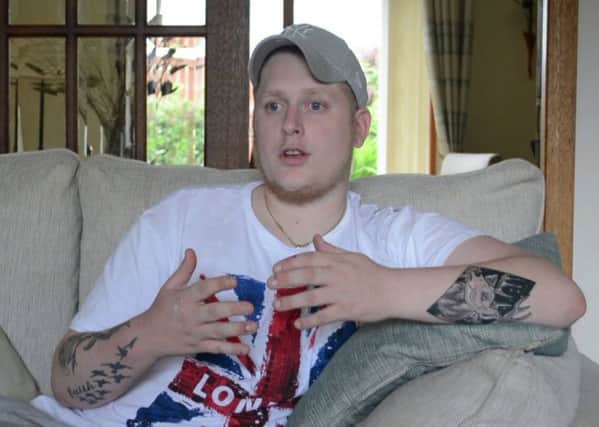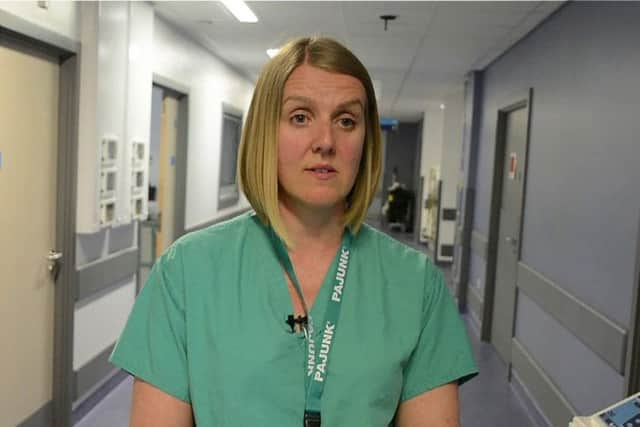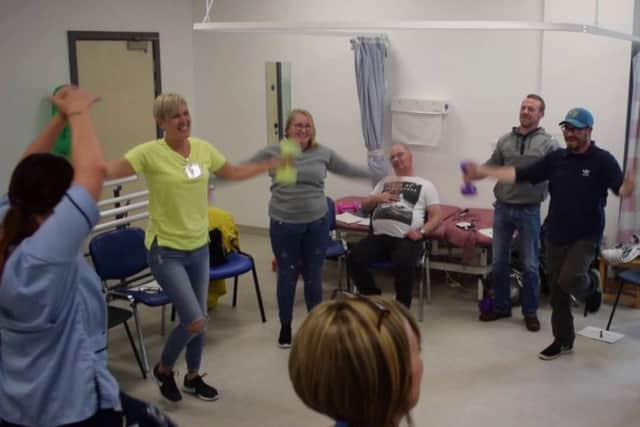Sepsis cost Fife man Grant Fenton his leg but he’s now getting his life back


So NHS Fife has launched a new programme, offering dedicated support not only to patients but their families.
InS:PIRE (Intensive Care Syndrome: Promoting Independence and Return to Employment) is aimed at patients who have been in intensive care but have recovered and are well enough to go home.
And it has already helped scores of Fife families.


Advertisement
Hide AdAdvertisement
Hide AdDr Lucy Hogg, NHS Fife consultant in intensive care medicine, said: “Patients who come to intensive care have life-threatening, critical illnesses.
“Part of the therapy to stabilise and support them can involve a number of invasive procedures, which may be uncomfortable or prolonged.
“For patients who are less than clear about where they are it can be a distressing and emotionally difficult time.
“Medications that are used to keep patients comfortable can also mean that their perception is distorted and they have a patchy recollection of events, making it difficult for them to make sense of what has happened.


Advertisement
Hide AdAdvertisement
Hide Ad“The InS:PIRE programme seeks to enable and empower patients and their families to manage their rehabilitation from a physical, emotional and psychological perspective.”
Patients are contacted between six and 12 weeks after their discharge and invited to attend the five-week programme over consecutive weeks with a family member or carer.
Grant Fenton (26), from Glenrothes, is just one of the patients who has been supported by InS:PIRE.
In February last year, Grant was diagnosed with sepsis, resulting in the loss of his right leg and kidney failure.
Advertisement
Hide AdAdvertisement
Hide AdHe said: “I was in intensive care for three weeks and in hospital for almost three months altogether.
“I clearly remember the hallucinations and delirium, which tricked my brain into thinking I was somewhere else.
“The hallucinations affected me for a long time. I often had nightmares and panicked remembering everything that had happened.
“At first I wasn’t too sure about InS:PIRE. I was out of hospital and wanted to stay out but my mum persuaded me to go and I’m glad I did.
Advertisement
Hide AdAdvertisement
Hide Ad“InS:PIRE was absolutely amazing and I can’t praise it highly enough.
“The first day I went I met staff who had looked after me and that was so helpful.
“I clicked instantly with other patients who had been in intensive care and was able to talk about what happened and they were able to share their stories too.
“I realised I was only at the beginning of my journey.
“I was terrified of the future but life is good now – I feel like I have a purpose and have turned negativity into positivity.”
Advertisement
Hide AdAdvertisement
Hide AdAs well as supporting Grant, the programme was also there for his loved ones.
His mum Aileen said: “We thought InS:PIRE would be really good for Grant; it seemed a very positive programme.
“Flashbacks and trauma were building up and he was struggling to deal with what had happened.
“He couldn’t talk about it and couldn’t break the cycle.
“We attended the programme with him. It helped us support him.
Advertisement
Hide AdAdvertisement
Hide Ad“InS:PIRE was such a help. Having coming through the experience we’re in a much more positive place.”
The programme starts with a one to one session between the patient and clinical staff involved in their care.
It also includes pharmacists explaining medications, physiotherapy support, including a group exercise class to assist with rehabilitation, and a clinical psychology group intervention for patients and carers, helping people to discuss the difficult feelings and emotions they have experienced.
There is also peer support and a cafe which gives participants an opportunity to speak to volunteers and other members of the group who have also experienced intensive care.
Advertisement
Hide AdAdvertisement
Hide AdOn completion of the programme patients are signposted to services in their local community.
Dr Chris McKenna, NHS Fife medical director, said: “Intensive care can be very disorienting for patients.
“As they recover, not only do patients have to deal with the physical changes which may be the result of a critical illness, there are also a huge range of emotions to process.
“In addition their loved ones have also been through a very worrying and anxious time.
“InS:PIRE allows patients and their families to understand and process their experience and to manage their recovery effectively going forward.”